Your British police are wonderful!
Posted on January 22nd, 2014
by padraigcolman
When police shot Mark Duggan in Tottenham, riots erupted all over England. There is tension yet again after an inquest jury decided that Duggan’s killing was lawful. Whatever the rights and wrongs of this particular case, it has revived interest in the conduct of the British police.
Since 1990, 1,476 people have died following police contact in Britain. Blair Peach was a campaigner against the far right, who died from a blow to the head during a demonstration against the National Front in Southall, west London. It took 30 years for Sir Paul Stephenson, the Metropolitan police commissioner to unequivocally accept the finding of a secret report that a Met officer was likely to be responsible for the death. Sir Paul expressed his “regret”.
 In 2012, PC Simon Harwood was found not guilty of killing Iain Tomlinson, a newspaper seller who was just walking home at the time, in 2009 during the G20 summit protests. The Met dismissed Harwood for gross misconduct.
In 2012, PC Simon Harwood was found not guilty of killing Iain Tomlinson, a newspaper seller who was just walking home at the time, in 2009 during the G20 summit protests. The Met dismissed Harwood for gross misconduct.

IPCC (Independent Police Complaints Commission) research found that 333 people died in police custody between 1999 and 2009, including 86 who died after being restrained. That figure included 16 of the most controversial cases classed as restraint-related. According to the Bureau of Investigative Journalism, some cases were not included in the statistics because the person was not officially arrested or detained.
Three deaths occurred after police restraint within one week in August 2011. Philip Hulmes, aged 53, and Dale Burns, 27, both died after police discharged taser guns. Jacob Michael, aged 25, died after police used pepper spray. Witnesses to his arrest have described how the police punched and kicked him while he was on the floor, restrained and in handcuffs. Eleven police officers were involved in the arrest.
There have been 32 fatal shootings by police in the past ten years. On 22 September 1999, Harry Stanley was returning home carrying, in a plastic bag, a table leg repaired by his brother earlier that day. Someone had phoned the police to report, “an Irishman with a gun wrapped in a bag”. The crew of a Metropolitan Police Armed Response Vehicle challenged Stanley. As he turned to face them, they shot him dead at a distance of 15 feet.
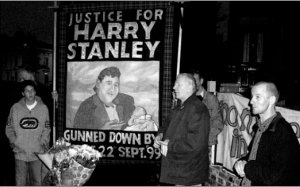
On July 22 2005, on a subway train at Stockwell station in south London, police shot Jean Charles de Menezes seven times in the head and once in the shoulder at close range. He died at the scene. Hollow point bullets, which are illegal in warfare, were used.
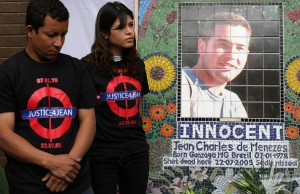 Andrew Hayman was the head of the anti-terrorism unit which carried out the killing. The IPCC report concluded that there were inconsistencies between what Mr Hayman had told a crime reporters’ briefing and what he told a Metropolitan police authority management meeting on the day of the shooting. Hayman got a CBE in the June 2006 Honours list.
Andrew Hayman was the head of the anti-terrorism unit which carried out the killing. The IPCC report concluded that there were inconsistencies between what Mr Hayman had told a crime reporters’ briefing and what he told a Metropolitan police authority management meeting on the day of the shooting. Hayman got a CBE in the June 2006 Honours list.
I recall seeing a powerful play back in 1982, by GF Newman, called Operation Bad Apple. The title refers to the standard police explanation for corruption – a rotten apple in an otherwise clean barrel. “Rotten apples” are either weak individuals who have slipped through the screening process or succumbed to the temptations or acculturation inherent in police work. A writer in a magazine for policemen says “all police officers should be not tarnished with the same brush”. Home Secretary Theresa May told the House of Commons on June 21:”The vast majority of police officers are honest and act with integrity,”
Operation Countryman provided the inspiration for Newman’s play. This was a £3 million investigation into police corruption in London in the late 1970s. Eight police officers were prosecuted but none convicted. An informer occupying an important position in the criminal underworld claimed that members of the elite Flying Squad were receiving bribes from criminals in return for warnings of imminent police raids or arrests, the fabrication of evidence against innocent men, and dropping of charges. The corruption was not limited to “a few bad apples” but was endemic and widespread throughout the hierarchical command rather than confined to those below the rank of sergeant. Successive Home Secretaries refused to publicly release the findings of Operation Countryman as they are protected by public interest immunity.
In recent days, The Independent published details of a leaked report about another investigation, Operation Tiberius. The Metropolitan Police file, written in 2002, found Britain’s biggest force suffered “endemic corruption” at the time. Notorious criminal gangs had bribed scores of former and then-serving detectives to access confidential databases; obtain live intelligence on criminal investigations; provide specialist knowledge of surveillance, technical deployment and undercover techniques to help evade prosecution; and even take part in criminal acts such as mass drug importation and money laundering. Tiberius identified 80 corrupt individuals with links to the police, including 42 then-serving officers and 19 former detectives. A corrupt officer had “an ongoing sexual relationship with a female drug supplier”’, and accessed police records for her.
The report concluded: “Organised crime is currently able to infiltrate the Metropolitan Police Service at will.” Police offered the usual reflex reaction about bad apples and the past being different. A recently retired senior officer, speaking anonymously to the newspaper, said that: ‘The Met is still every bit as corrupt as it was back then.’
The author of the 2002 report was that same Andy Hayman who lied about the Menezes killing in 2004. An inquiry later found that Operation Helios, a £7 million investigation, which was under the direct control of Andy Hayman from 1999 to 2003, may have been motivated by race. This same Andy Hayman resigned from the police in December 2007 over allegations about expense claims and improper conduct with a female member of the IPCC and also with a female Sergeant, Heidi Tubby. This same Andy Hayman was in charge of a raid on a dwelling in Forest Gate in 2006 in which police shot one man seriously assaulted another. A local watchdog group said: “a small group of police officers …have anonymously fed information to the media in return either for cash, the conducting of inter-agency feuding between the Met and the security services over apportioning blame or simply in order to undermine the accountability of a public service”. The Met leaked to the press unfounded allegations of child pornography, which caused the shot man and his family “‘irreparable damage”, in the words of his sister. An enquiry by the chief surveillance commissioner, Sir Christopher Rose, apportioned responsibility for bugging an MP in 2005 to the same Andy Hayman.
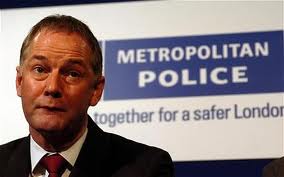 Hayman did not cover himself in glory when questioned by a Commons committee about the News the World hacking scandal. According to the late, lamented Simon Hoggart, one of the MPs called him “a dodgy geezer” to his face. When an MP asked if his investigation was compromised by accepting hospitality and employment from Rupert Murdoch –”You would have thought she’d accused him of being a predatory paedophile, not someone who had conducted a hopelessly inadequate inquiry into a firm which had wined and dined him, and then given him a well-paid job.” Keith Vaz MP told Mr Hayman that he appeared “more like Clouseau than Columbo”.
Hayman did not cover himself in glory when questioned by a Commons committee about the News the World hacking scandal. According to the late, lamented Simon Hoggart, one of the MPs called him “a dodgy geezer” to his face. When an MP asked if his investigation was compromised by accepting hospitality and employment from Rupert Murdoch –”You would have thought she’d accused him of being a predatory paedophile, not someone who had conducted a hopelessly inadequate inquiry into a firm which had wined and dined him, and then given him a well-paid job.” Keith Vaz MP told Mr Hayman that he appeared “more like Clouseau than Columbo”.
The phone hacking scandal demonstrated that cronyism provides fertile ground for corrupt practices. The Met could rely on News International to defend them over cases like De Menezes and Tomlinson. Police forces provide tip-offs and stories and expect the media to reciprocate by reflecting a police perspective of events. Coverage of demonstrations and rallies frequently reflect a police viewpoint. In the Met’s public statements, there is a pattern of manipulation. Through a variety of channels, through networking with local government, private industry and the media the police have long been in the business of influencing government policy.
The IPCC oversees complaints, as well as automatically investigating all deaths involving the police, but there is little public confidence in its independence. Only ten per cent of complaints succeed and a significant proportion of those are complaints from other police officers. Eight out of ten of the IPCC’s senior investigators and more than a third of all investigators are former police.
There is no watchdog that effectively oversees the mechanics of British policing.
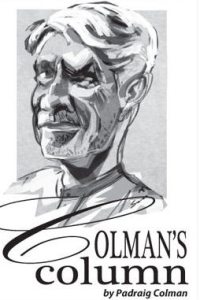
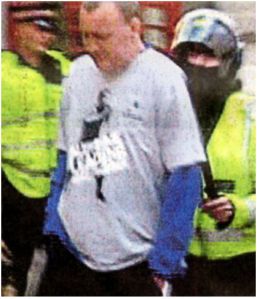
January 23rd, 2014 at 9:19 am
British police is the best of it’s kind in the world, because I worked with them and my son is with them. Rights of it’s citizens are paramount to them and there’s respects for them from both sides of the divide, but can’t say same to the politicians and the police are not their favourites for obvious reasons. I was there at the incident of Blair Peach and that was one of the unfortunate episodes of the force and it’s relatively rare..